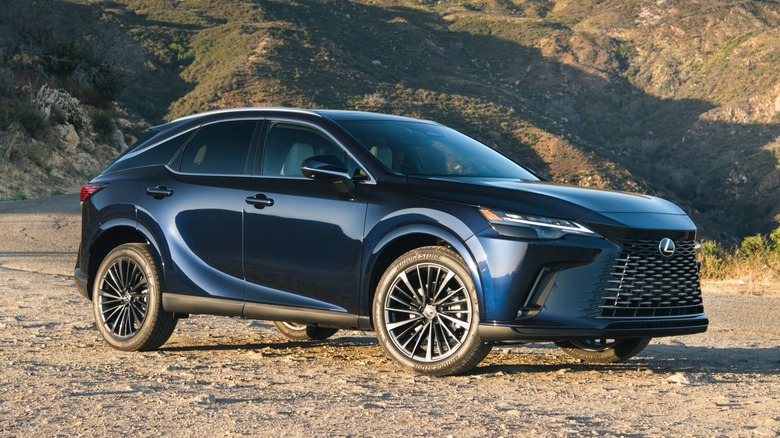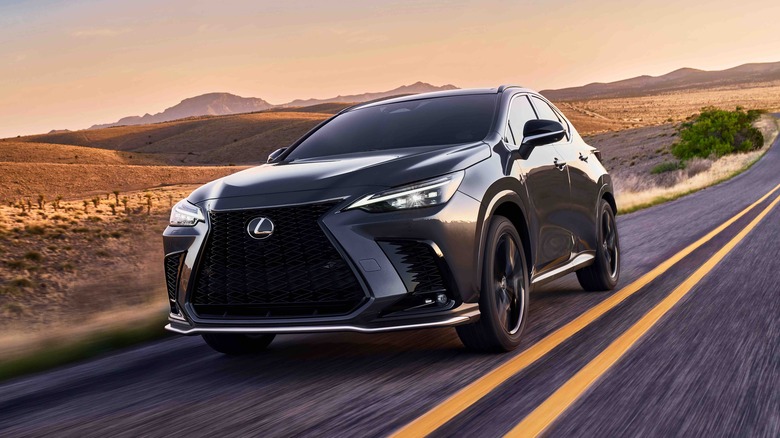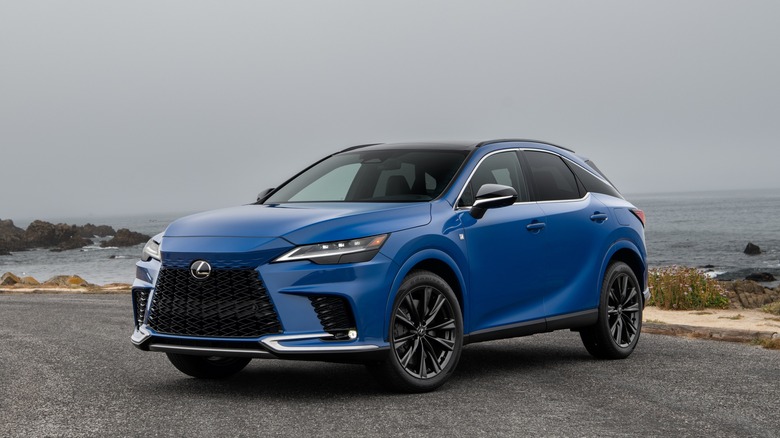Lexus RX Vs. NX: How Do The Two Luxury SUVs Compare?
Lexus' lineup of vehicles appears like a serving of alphabet soup, with nameplates like the LX, LS, GX, and RZ. Two models, the RX and NX, stand out as the automaker's best sellers, and they have much in common, both being two-row unibody crossovers with similar design and features. Yet, the RX and NX occupy separate positions among the company's offerings and have different capabilities and price tags. We'll break down how the RX and NX compare, which can be helpful if you're shopping for a Lexus SUV or already have one in the driveway.
Debuting for the 1998 model year, the RX (which stands for Radiant Crossover) was Lexus' first crossover and an early entry in the midsize luxury SUV segment. The model quickly climbed the brand's sales charts, eventually becoming the company's best-seller as of 2025. While primarily known as a two-row crossover, the RX was also available in three-row form (the RX L) from 2017 through 2022, as part of the fourth generation. The fifth-generation RX debuted for the 2023 model year and continues into 2025.
With compact competitors like the Acura RDX and BMW X3 gaining a foothold in the premium market, Lexus introduced the NX (Nimble Crossover) for the 2015 model year. The NX mimicked the RX's design while offering customers a more affordable Lexus SUV. Today, the NX is the second-best-selling Lexus. Until the 2019 release of the subcompact UX, the NX was the brand's entry-level crossover. Now in its second generation, the NX remains available only as a two-row vehicle.
Lexus RX vs. NX: size and performance
While the U.S. EPA classifies both 2025 model year vehicles as small SUVs, the label can be misleading. The RX's 192.5-inch length and 112-inch wheelbase give it dimensional bragging rights over the NX's 183.5-inch length and 105.9-inch wheelbase. The gap narrows inside, with both offering about 41 inches of front legroom. Rear passengers get 37.4 inches in the RX versus 36.1 inches in the NX. Cargo space behind the rear seats favors the RX (29.6 cubic feet) over the NX (22.7), but maximum capacity with the seats folded is slightly greater in the NX (46.9 cubic feet) than in the RX (46.2).
The base RX 350 uses a turbocharged 2.4-liter four-cylinder with 275 horsepower, while the NX 250 has a naturally aspirated 2.5-liter four-cylinder producing 203 horsepower. An AWD RX 350 hits 60 mph in 7.2 seconds, compared to 8.6 seconds for an AWD NX 250. Upgrading to the NX 350 brings the turbocharged 2.4-liter from the RX 350. Hybrid versions, the RX 350h and NX 350h, share an electrified 2.5-liter four-cylinder, producing 246 and 240 horsepower, with 0-60 mph times of 7.4 and 7.2 seconds, respectively.
Both are available in 450h+ plug-in hybrid form with a 2.4-liter engine rated at 304 horsepower. In this form, the NX reaches 60 mph in 6.0 seconds, 0.2 seconds faster than the RX. There is no NX version of the top-tier RX 500h F Sport Performance, which combines hybrid tech and turbocharging to deliver 366 horsepower and a 0-60 mph time of 5.9 seconds.
Lexus RX vs. NX: pricing and features
The base RX 350 with FWD costs $50,575, while adding AWD increases the total to $52,175 (both including $1,450 destination fee). Meanwhile, the least-expensive NX (the FWD NX 250) stickers at $42,260. Stepping up to the NX 350 with standard AWD and the same engine as the RX 350 costs $46,020 (both prices include $1,295 destination), a $6,155 savings over its RX equivalent. Understanding the difference between the NX 250 and NX 350 trims can help decide if the latter is worth it.
You'll pay a premium for fuel-efficient hybrid versions. The least-expensive RX hybrid (RX 350h) has a $52,875 price, while the NX's hybrid entry point (NX 350h) costs $46,720. Plug-in hybrids cost even more: The RX 450h+ Luxury starts at $72,710, a significant increase over the NX 450h+ Luxury's $62,535. The cheapest RX 500h (with no NX counterpart) costs $66,250. All prices include destination fees.
The RX and NX have Lexus Safety System 3.0, which covers technologies such as automatic emergency braking and lane departure alert. Both vehicles are also comparable in terms of infotainment systems. Both models' base trims have a 9.8-inch touchscreen, while a 14-inch setup is optional (and comes as standard in more premium variants). In addition, each model's matching upscale trims have mostly comparable features. For example, the RX 350 Premium and NX 250 Premium both have a driver's seat memory system and heated and ventilated front seats. One notable difference is that the RX has 19-inch alloy wheels, while the NX starts with 18-inch rims.


